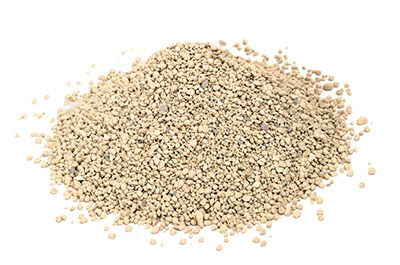|
 Bentonite is a natural clay, which has the ability to swell more than 15 times its normal volume when placed in water. This property is used in the making of a seal in a soil layer. When Bentonite is mixed with soil, and compacted, it swells when water is added filling all the voids between the soil particles. As a result, the opportunity for water to pass through the soil is greatly reduced. Bentonite is a natural clay, which has the ability to swell more than 15 times its normal volume when placed in water. This property is used in the making of a seal in a soil layer. When Bentonite is mixed with soil, and compacted, it swells when water is added filling all the voids between the soil particles. As a result, the opportunity for water to pass through the soil is greatly reduced.
The implementation of Bentonite requires the area to be cleared of vegetation, rocks, and foreign material. It is then excavated and contoured to its final shape with gradual side wall slopes, and the top layer is loosened to 150 mm. Water is added to the required moisture level, and the Bentonite is then spread on top of the surface. Using a rotovator, tiller, or by hand mix the Bentonite into the soil. Finally, the area is compacted using a roller, vibrating compactor or similar equipment until a suitable degree of compaction is obtained. Correct compaction is vitally important to any sealing operation.
After compaction the area is then further hydrated by wetting the surface thoroughly. This allows the Bentonite to swell within the soil structure, and after a period of time, water can be added to the final level of the dam.
As Bentonite takes time to fully hydrate, a certain amount of water loss is experienced initially. After a few days that loss will be reduced and the dam, or pond will successfully retain water.
Bentonite can also be used to repair existing dams, but it is important to identify where the leak occurs. Repair methods include the application of granular Bentonite on top of the water surface, the manual addition of a soil/Bentonite mix to erosion holes, or the construction of cut off trenches. Bentonite can also be used with cement to repair leaks in old cement-lined dams.
The use of cut off trenches in large dams requires professional civil engineering advice.
Due to the simple application methods, Bentonite is ideally suited to both the skilled and unskilled user. Once installed, it forms an integral part of the pond or dam, and being a natural clay it is completely safe for animals or fish. Its function in soils is well understood and with technical advise from the suppliers, a successful result can be assured.
Other uses:
• As a binder of sand in the foundry industry
• As an additive to drilling muds in the Oil Drilling industry
• As a clarifier in the wine & fruit juice industry.
• As a cat litter along with Zeolite which is also available.
|

